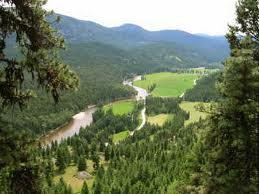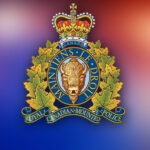Ministry staff are keeping an eye on the Kettle River
The need for monitoring and controlling future water flows in the Kettle River is no longer a question with 582 water licences along the river and repeated annual low flow levels. The Kettle is the number one endangered river in B.C. and government staff are more than aware of the challenges for both water quality and fish survival. Tara White, a senior fish biologist with the Ministry of Natural Resource Operations (MNRO), hosted an open community meeting in Grand Forks on Wednesday, Mar. 9 to provide information on recent monitoring studies. Along with White, Carl Withler, Ministry of Agriculture, and Phil Epp, hydrologist with MNRO, were on hand to answer questions and present information. From an area C perspective, Director Grace McGregor says Christina Lake is impacted by the health of the river as well as monitoring concerns for water licencees and the Cascade Power Project. “This (meeting) was held to start some dialogue,” explained McGregor. “They plan to hold more meetings and consultations, and share more information. They have their own concerns about the river which of course is part and parcel of what everybody is concerned about all the down the river.” Epp presented 2010 hydrology report including water flow and temperature analysis. Low flow levels and high temperatures are the most important causes of fish mortality. Epp said flow patterns over the years in the Kettle are relatively normal with high water up to over 100 cubic metres per second (cms) in the spring in a normal year and about 60 cbs in a low year. But this level drops significantly by August and the lowest on record is one cbs flow in 2003. Epp noted that in 2010 they did see an anomaly in flows which tend to increase downstream as tributaries add to volumes. Between Midway and Ferry County (United States) monitoring sites the flow decreased. “Instead of seeing more water downstream we’re actually seeing less,” said Epp. “I take this as evidence that we are actually seeing water being pulled from the river, not just ground water.” Irrigation licences also contribute to potential flow problems and impact fish habitat. Epp noted that the current level of irrigation licencing along the Kettle allows for 33,375 acre feet of water to be taken from the river or a total of 4.73 cms from the north near Big White through to Grand Forks. And that does not include the water taken in the United States. “If all the water licences were being fully utilized you’d have about 3.5 cbs being used at Midway. In 2009 there was 2 cubic metres left in the river, so it’s actually twice as much water could have been being used as what was left in the river.” Epp cleared stated there was no more room for water licences, especially during August and September. A water demand study is in the works but the study will not include personal wells that impact ground water. The topic of Big White and their request for more water storage licences was raised by Al Grant, a West Boundary resident with the Boundary Alliance. Grant argued that the storage at the ski resort impacts the river. “That water contributes to a healthy freshet. If its freely flowing it contributes to large woody debris which is one of the things we end up paying for with these various projects being done,” said Grant. “Perhaps we wouldn’t have to be paying for these things if the large woody debris was allowed to form naturally.” Epp agreed that he would look at the storage facilities at Big White during the upcoming summer, but did say that if they are pulling water from freshet the impact on water levels throughout the region is minimal. “I think people are not near as well informed on water issues as they need to be,” said McGregor. “People do need to understand what our rivers and streams look like. And the do need to understand what fish need and the fact that fish and other organisms in that river and the side tributaries are what keeps it healthy.”
This meeting was just one in a series of community outreach activities for the ministry staff and they hope to continue to provide information and dialogue with the community on a regular basis.























